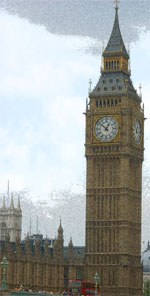DPR Voting - simple, practical electoral reform
|
The Electoral Reform Debate |
'The operation of the electoral system is not the sexiest of topics. But like indoor plumbing, you start to notice it when it stops working.' LSE Electionforecast.co.uk blog |
A new voting system is central to UK electoral and political reform.
|
The meaning of Proportional Representation
The term ‘Proportional Representation’ (PR) can mean different things to different commentators, and there are several different PR systems. This term applies only to a system that counts the votes cast and translates them into votes in the House of Commons such that there is a direct and (near) proportional link between the votes cast for the various political parties in the General Election and the votes those Parliamentary Parties will ‘control’ in the Parliament. The term ‘near’ is necessary because perfect proportionality cannot be achieved, and is not necessarily desirable. Most people agree that a nascent political party needs to reach a certain level of support before it can expect to be represented in Parliament. |
Fair Votes in Parliament
If the voter is asked on the ballot paper to vote for a party rather than a candidate, it is possible to say how many votes each party should have in the parliament, based on the votes cast for each party across the whole country. First Past the Post cannot result in ‘Fair Votes’ except by an unlikely accident. In order to reflect the way the votes were cast, many ‘proportional voting’ (PR) systems try to match the number of MPs to the number of Fair Votes for each party. In each case compromises have to be made. Some compromises are less satisfactory than others. This is most clearly seen in List PR systems where MPs are ‘elected’ from a party list in proportions as close to the Fair Vote numbers as possible. The compromise is that the voter has little influence on the election of the individual MPs. The Party determines the order of candidates on the list. There are no constituency MPs. Other ‘hybrid’ systems use a mix of constituency MPs and top up list MPs. This means two types of MPs and two ways that they may be elected. These systems require new larger constituencies than those in use for the current FPTP system. DPR Voting overcomes these problems. An advantage of the system is that all MPs are constituency MPs and can be elected based on the merit of the individual rather than their party label. |
The Electoral Reform Debate The debate about electoral reform in the UK has been blighted by speculation about which party would benefit – the speculative answers tend to reflect short term thinking, or even very short term. The important benefits of Electoral reform are long term. What do we want to gain from electoral reform? The debate about electoral reform should include firstly attitudes to political parties (in general terms, not the particular parties) and secondly the importance of the individual candidates (again in general terms) and their significance in our democratic system. Political parties are not currently well regarded, but this is perhaps principally a fall out from our electoral system, which not only picks the winner, but shapes the behaviour of all the parties and politicians – and it is not a constructive influence. In the debate, concerns about the mechanics of the vote should be important – democracy has to be open, transparent and inclusive, so this is right and proper. Ideally voting should be simple and thus inclusive. Counting should be simple and quick. The electoral process needs to be transparent, understood and trusted. How important is the local contest, and how large or small should the constituency be? Should the system be party proportional? The electoral system influences whether or not a party with minority support can rule alone, or whether parties have to join together in coalition. Linked to this is the question of whether or not it is good to have a system that makes a complete change of Government after a five year period more likely. However all too frequently the debate is partisan and shaped by short term advantage, and as a result FPTP is likely to self destruct, and our politics with it. Now more than ever we need a constructive dialogue on electoral reform. |
The Voter's Dilemma Case 1 I live in a constituency which returns a Conservative (or could be Labour, Liberal, Green, UKIP etc) MP. He is an excellent, independent minded MP who will hold the Conservative Government to account on occasions. He is active with specialist skills on various Parliamentary Committees, and also works hard to look after his constituents. My preferred party is weak in this area and puts up candidates who are clearly second best to the sitting MP. But I very much prefer their policies, and don't like the Conservative Prime Minister. Do I vote for the best candidate to be the MP even if it means voting for a party I don't want to win? or do I vote for the party I want and elect a useless MP to replace an excellent one? DPR Voting offers a solution. I can vote for my preferred party in the Party vote, and also for the sitting MP whom I admire. Case 2 Case 3 |
House of Lords Reform
|
Why the House of Lords need to be reformed.
|
| Useful links: |
| House of Lords Reform Draft Bill |
| Background - Constitution Unit publication. |
| Briefing Paper by Dr Alan Renwick, Political Studies Association |
| House of Lords Appointments Commission |
| House of Lords Library briefings: various |
| Public Attitudes Towards the House of Lords and House of Lords Reform |
Lords Reform Proposal
The Lords could be elected by Closed PR plus list. (Plus is for an independent list.) The elected Lords must be different from the Commons. Constituency or regional representation is via the lower house and not necessary for the Upper House. Independent peers could be elected by having ‘Independent' (for a list of independent candidates) as a voting choice alongside the political parties. The campaigning for a Lords election would be minimised if held concurrently with a General Election. Voting (and counting) should be very simple.
Objective – To make an effective elected second chamber, composed of mature experienced individuals with collective experience of all aspects of British life, whose principal task is to improve legislative bills during their passage through parliament into law, and whose secondary task is to scrutinize the actions of the government and act as a watchdog for the rights of the British people, should the Government or lower house appear to act in such a way as to undermine these rights.
This is best achieved by bringing together experienced politicians put forward by their parties with politically independent but experienced individuals to work together to form a judgment on all matters brought to them by the lower chamber, without undue pressures of formal party political allegiance.
Party patronage should be balanced by a strong independent element, and a 15 year tenure (subject to the rules of the house, rather than party patronage.
Mechanism
This could be achieved much as has already been suggested elsewhere as follows.
The Upper House to be composed of 300 ‘peers'
(phased in by enforced retirement of one third of existing peers at the end of each of three 5 year periods)
Each new peer to be elected for three parliamentary terms
One third of vacancies to be elected at each General Election. ie 100 peers per election
(Assumes fixed term 5 year parliaments)
An independent commission would vet all potential prospective candidates for their suitability regardless of party. Independent candidates could apply directly, or be approached by the Commission. Each party could also nominate candidates. All candidates would declare whether they are a ‘party' or ‘independent' candidate. Each party prepares a party list of candidates. The Independent Commission would undertake this task for the independent candidates.
The process of election (closed party list)
The vetted candidates' credentials would be published and publicised
1 The party and independent candidates' lists would be published in order of preference
2 Voters would have an additional ‘Lords' ballot paper with a single vote to choose a party or ‘Independent' (at the same time as they vote in the General Election). Thus each party would win a percentage of the total vote.
3 Based on 100 vacancies, for each party (and independent group) percentage point, one peer would be elected from its list.
Peers should be paid a salary, and expected to be present for an agreed amount of parliamentary time.
Should a peer resign (or be sacked for misdemeanours or non attendance) there would be no ‘by-elections', there would just be fewer peers until the election process appoints new peers.
The parliament act would stand. The primacy of the House of Commons would be acknowledged during of the formation of the new House of Lords.
PAGE UNDER CONSTRUCTION
What does the House of Lords do?
The Role of the House of Lords:
The role of the House of Lords is to scrutinise and suggest improvements to bills, and to hold the Government to account for its actions. But its powers are limited.
The House of Commons decides who forms the government. The government’s survival depends on support in the Commons, not the House of Lords.
The House of Lords has almost no powers to change the government’s tax and spending plans.
On other legislation, the House of Lords can delay bills by one year, but it cannot block them. The House of Commons can invoke the Parliament Acts to get bills passed
The argument for reform
|








